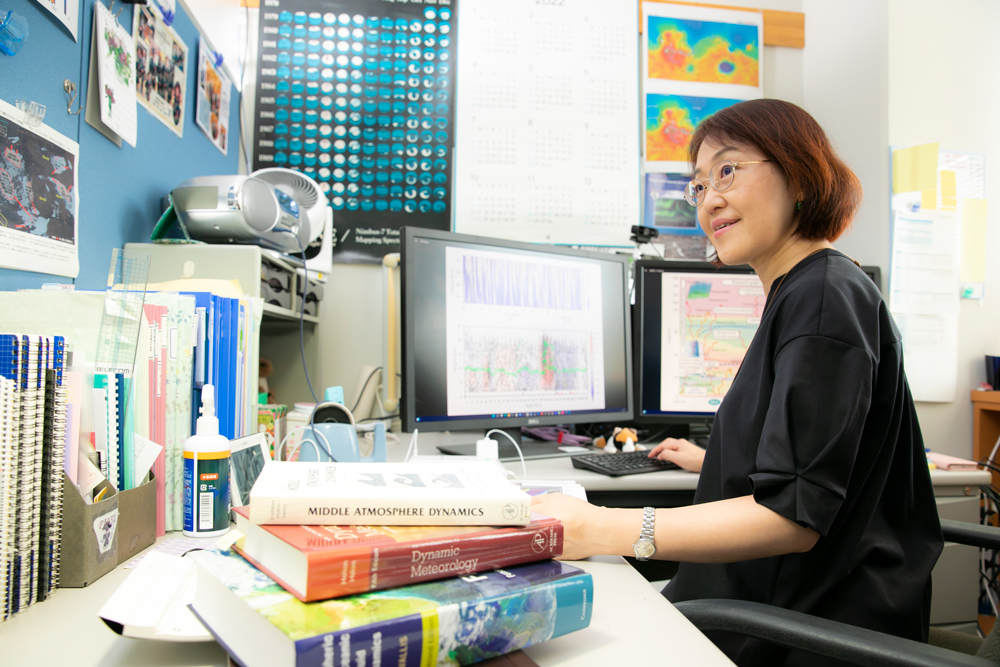Disclaimer: machine translated by DeepL which may contain errors.

Fascinated and challenged by atmospheric phenomena

![]() Kaoru Sato, Professor, Department of Earth and Planetary Science
Kaoru Sato, Professor, Department of Earth and Planetary Science
In 1991, completed her doctoral studies in geophysics at the Graduate School of Science, Kyoto University and obtained Ph. D. In 1995, she joined Kyoto University as an Assistant Professor and began researching atmospheric gravity waves and their role in global-scale atmospheric phenomena and studying the physics of the hierarchical structure embedded in the atmosphere, using large atmospheric radars, radiosondes, and a high-resolution general circulation model for the atmosphere. In 1999, she was appointed Associate Professor at the National Institute of Polar Research, where she initiated a project of the first large-scale atmospheric radar (PANSY) in Antarctica. Installation of the PANSY radar at Syowa Station began in 2011, and continuous observations with the full system are currently being conducted. She was a member of the winter party of the 44th Japan Antarctic Research Expedition (JARE) (2002-04) and the summer party of the 60th JARE (2018-19). She has been in her current position since 2005. She received the Fujiwara Award from the Meteorological Society of Japan, the Commendation for Science and Technology by the Minister of Education, Culture, Sports, Science and Technology, and the Medal with Purple Ribbon in 2021.
Q. What was your favorite subject as a child?
A. Science , math, and music
I loved science because I found experiments with counterintuitive results interesting. I loved math because solving math problems was fun. I loved music. I used to play four-handed piano music with my friend next door. I was fascinated by the variety of sounds impossible to produce alone.
Q. What is your motto?
A. Hindsight is 20/20.
Even if we set goals, gather ideas, and put in effort thoughtfully, there are many times when we wish we had done something differently. But that is normal. I have decided to consider this proof that I am constantly challenging myself.
Q. What do you like about the School of Science?
A. Respecting each other's research fields
Even though we scientists are engulfed in our own research, we often resonate with each other despite working in different fields. So, it is always fun whenever we have a chance to talk with each other.
Q. What are your hobbies?
A. Music
I have had more time to play the piano since working from home became an option during the pandemic. I play only about 15 minutes a day so that it does not affect my work, but I am gradually working on new pieces.
Q. What books would you recommend to students?
A. An Introduction to Dynamic Meteorology by James R. Holton
Although it is a specialist book, it is a must-have for students interested in meteorology. Although it is now in its 5th edition, the 4th edition, written by Dr. Holton alone, is probably easier to read. Written in clean and concise English, it is full of fascinating physics of the atmosphere.
Q. What is your source of inspiration?
A. Having discussions with students or collaborators at the lab or going for a walk to think
I think it is because discussing aloud helps me to organize issues and consider them from various angles at the same time. When I am walking while thinking, I cannot see what is going on around me, so I am afraid that if I meet someone I know, I may not notice them and be rude.
Q. If you could travel in time, where would you go?
A. I would want to go to the future
The global environment is changing drastically due to human activities. Although action is being taken to maintain a livable environment for the future, seeing the results of these efforts takes longer than a lifetime. I hope the future is wonderful.
Message


